10 jan 2019

By Alaa Tartir
Agriculture is commonly perceived as the backbone of Palestinian society and economy, with farmers viewed as the last stronghold of resistance.
Working the land is seen as an illustration of steadfastness, as farmers continue to preserve and reclaim land, build self-reliance and challenge forced dependency and economic asymmetry. In essence, farming is a political act that aims to challenge oppression and achieve freedom.
In reality, however, this backbone has been severely damaged, if not paralyzed, by the continuation of Israel’s occupation and the damaging policies of the Palestinian Authority (PA). Palestinian farmers have been shackled by both Israeli colonialism and Palestinian neoliberalism.
Stealing land
As the colonial power, Israel continues its land confiscation and territorial annexation policy by expanding settlements, nourishing settler violence, stealing land and natural resources, imposing policies of siege and blockade, and controlling exports and imports. Each is an element within a matrix of control directed at colonizing Palestinians.
In recent decades, Israeli authorities have uprooted more than 2.5 million fruit trees and 800,000 Palestinian olive trees - equivalent to 33 New York Central Parks.
Meanwhile, PA policies and the donor-driven “development” model have contributed to the deterioration of the agriculture industry, with less than one percent of the PA’s budget allocated to the besieged sector. This terrible neglect has contributed to a pervasive process of de-development that has gradually deprived farming of its transformative potential, while expanding Israel’s territorial dominance and control.
While the implications of this politically constructed process extend beyond agriculture, this sector most clearly conveys the problem. By essentially adopting the “rich individuals, poor nation” mantra, the PA has unconsciously echoed the practices of the Israeli occupation.
Bleak prospects
Additional indicators illustrate the sector’s bleak prospects. Agriculture barely contributes to the Palestinian GDP, while the agricultural labor force has fallen dramatically as a percentage of the total labor force. The average yield per dunum (1000 square meters) is half that of Jordan and only 43 percent of that of Israel, despite the fact that these countries share an almost identical natural environment. Palestinian water use for agriculture is estimated to be one-tenth of Israel’s, according to the UN.
Only one in four households in the West Bank and Gaza is food secure, while more than 70 percent of communities located entirely or predominantly in Area C in the occupied West Bank, under full Israeli control, are not connected to the water network. Around 95 percent of Gaza’s main water supply is unsafe for drinking without treatment.
The World Bank has estimated the potential direct additional output of a number of sectors, including agriculture, at around $2.2bn - equivalent to 23 percent of the 2011 Palestinian GDP. The UN Conference on Trade and Development, meanwhile, has estimated that the Palestinian agricultural sector is currently operating at perhaps a quarter of its potential.
Yet, from the Israeli perspective, this damage translates to clear benefits for the Israeli economy and settlers. For the Israeli government, agriculture is an offensive weapon that can be used to deny Palestinian rights. Many of the agricultural products grown by Israeli settlers in the occupied Palestinian and Syrian territories are exported to Europe.
Colonial strategy
The fundamental deficiencies that plague the Palestinian agricultural sector are driven by the decades-long Israeli colonization of Palestine. This process of colonization rested upon the conquest of Palestinian land, which sought to restrict and confine independent Palestinian development, both political and economic. De-development is not an unfortunate or coincidental outcome, but a deliberate and focused colonial strategy.
Far from challenging or contesting colonial power, the PA has instead often functioned as a conduit for it. Trapped as it is between Israeli colonialism and Palestinian neoliberalism, the Palestinian agricultural sector is in a pernicious double-bind that frustrates its contemporary and future development.
To continue under these circumstances is to undertake an act of resistance: to farm Palestine is to farm for freedom.
- Dr Alaa Tartir is program adviser to Al-Shabaka, the Palestinian Policy Network, and a research associate at the Center on Conflict, Development and Peacebuilding (CCDP) at the Graduate Institute of International and Development Studies (IHEID) in Geneva, Switzerland. His article appeared in the Middle East Eye.
Agriculture is commonly perceived as the backbone of Palestinian society and economy, with farmers viewed as the last stronghold of resistance.
Working the land is seen as an illustration of steadfastness, as farmers continue to preserve and reclaim land, build self-reliance and challenge forced dependency and economic asymmetry. In essence, farming is a political act that aims to challenge oppression and achieve freedom.
In reality, however, this backbone has been severely damaged, if not paralyzed, by the continuation of Israel’s occupation and the damaging policies of the Palestinian Authority (PA). Palestinian farmers have been shackled by both Israeli colonialism and Palestinian neoliberalism.
Stealing land
As the colonial power, Israel continues its land confiscation and territorial annexation policy by expanding settlements, nourishing settler violence, stealing land and natural resources, imposing policies of siege and blockade, and controlling exports and imports. Each is an element within a matrix of control directed at colonizing Palestinians.
In recent decades, Israeli authorities have uprooted more than 2.5 million fruit trees and 800,000 Palestinian olive trees - equivalent to 33 New York Central Parks.
Meanwhile, PA policies and the donor-driven “development” model have contributed to the deterioration of the agriculture industry, with less than one percent of the PA’s budget allocated to the besieged sector. This terrible neglect has contributed to a pervasive process of de-development that has gradually deprived farming of its transformative potential, while expanding Israel’s territorial dominance and control.
While the implications of this politically constructed process extend beyond agriculture, this sector most clearly conveys the problem. By essentially adopting the “rich individuals, poor nation” mantra, the PA has unconsciously echoed the practices of the Israeli occupation.
Bleak prospects
Additional indicators illustrate the sector’s bleak prospects. Agriculture barely contributes to the Palestinian GDP, while the agricultural labor force has fallen dramatically as a percentage of the total labor force. The average yield per dunum (1000 square meters) is half that of Jordan and only 43 percent of that of Israel, despite the fact that these countries share an almost identical natural environment. Palestinian water use for agriculture is estimated to be one-tenth of Israel’s, according to the UN.
Only one in four households in the West Bank and Gaza is food secure, while more than 70 percent of communities located entirely or predominantly in Area C in the occupied West Bank, under full Israeli control, are not connected to the water network. Around 95 percent of Gaza’s main water supply is unsafe for drinking without treatment.
The World Bank has estimated the potential direct additional output of a number of sectors, including agriculture, at around $2.2bn - equivalent to 23 percent of the 2011 Palestinian GDP. The UN Conference on Trade and Development, meanwhile, has estimated that the Palestinian agricultural sector is currently operating at perhaps a quarter of its potential.
Yet, from the Israeli perspective, this damage translates to clear benefits for the Israeli economy and settlers. For the Israeli government, agriculture is an offensive weapon that can be used to deny Palestinian rights. Many of the agricultural products grown by Israeli settlers in the occupied Palestinian and Syrian territories are exported to Europe.
Colonial strategy
The fundamental deficiencies that plague the Palestinian agricultural sector are driven by the decades-long Israeli colonization of Palestine. This process of colonization rested upon the conquest of Palestinian land, which sought to restrict and confine independent Palestinian development, both political and economic. De-development is not an unfortunate or coincidental outcome, but a deliberate and focused colonial strategy.
Far from challenging or contesting colonial power, the PA has instead often functioned as a conduit for it. Trapped as it is between Israeli colonialism and Palestinian neoliberalism, the Palestinian agricultural sector is in a pernicious double-bind that frustrates its contemporary and future development.
To continue under these circumstances is to undertake an act of resistance: to farm Palestine is to farm for freedom.
- Dr Alaa Tartir is program adviser to Al-Shabaka, the Palestinian Policy Network, and a research associate at the Center on Conflict, Development and Peacebuilding (CCDP) at the Graduate Institute of International and Development Studies (IHEID) in Geneva, Switzerland. His article appeared in the Middle East Eye.
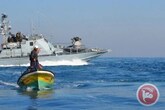
A Palestinian fishing boat was set on fire, on Thursday, after Israeli naval forces repeatedly fired towards it off of the coast in the northern besieged Gaza Strip.
Head of the Palestinian Fishermen Union in Gaza, Zakariya Bakr, said that Israeli naval forces opened fire towards Palestinian fishing boats located three nautical miles off of the northern coast of Gaza and ignite a fire in one of them.
Bakr confirmed that two Palestinian fishermen were present on the boat as it caught on fire due to repeated gunfire. He identified them as Mahmoud Hamoud Ishkantana and Muhammad Mahmoud Ishkantana.
The two fishermen were detained by Israeli naval forces and taken to an unknown location.
As part of Israel's blockade of the coastal enclave since 2007, the Israeli army, citing security concerns, requires Palestinian fishermen to work within a limited "designated fishing zone," the exact limits of which are decided by the Israeli authorities and have historically fluctuated.
The Israeli army regularly detains and opens fire on unarmed Palestinian fishermen, shepherds, and farmers along the border areas if they approach the unilaterally declared buffer zone.
Israeli human rights group B'Tselem recently concluded that Israel's Gaza closure and "harassment of fishermen" have been "destroying Gaza's fishing sector," with 95 percent of fishermen living below the poverty line.
Head of the Palestinian Fishermen Union in Gaza, Zakariya Bakr, said that Israeli naval forces opened fire towards Palestinian fishing boats located three nautical miles off of the northern coast of Gaza and ignite a fire in one of them.
Bakr confirmed that two Palestinian fishermen were present on the boat as it caught on fire due to repeated gunfire. He identified them as Mahmoud Hamoud Ishkantana and Muhammad Mahmoud Ishkantana.
The two fishermen were detained by Israeli naval forces and taken to an unknown location.
As part of Israel's blockade of the coastal enclave since 2007, the Israeli army, citing security concerns, requires Palestinian fishermen to work within a limited "designated fishing zone," the exact limits of which are decided by the Israeli authorities and have historically fluctuated.
The Israeli army regularly detains and opens fire on unarmed Palestinian fishermen, shepherds, and farmers along the border areas if they approach the unilaterally declared buffer zone.
Israeli human rights group B'Tselem recently concluded that Israel's Gaza closure and "harassment of fishermen" have been "destroying Gaza's fishing sector," with 95 percent of fishermen living below the poverty line.
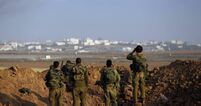
The Israeli occupation forces (IOF) on Thursday morning opened fire at Palestinian farmers and fishermen in the besieged Gaza Strip.
According to local sources, Palestinian farmers working their lands in the areas of Maleka and Taka, east of Gaza City, were exposed to Israeli gunfire.
The intensity of the shooting forced the farmers in those areas to leave their lands.
In a separate incident, Israeli gunboats also opened machinegun fire at Palestinian fishermen and their boats off the coast of Rafah area in southern Gaza, with no reported injuries.
According to local sources, Palestinian farmers working their lands in the areas of Maleka and Taka, east of Gaza City, were exposed to Israeli gunfire.
The intensity of the shooting forced the farmers in those areas to leave their lands.
In a separate incident, Israeli gunboats also opened machinegun fire at Palestinian fishermen and their boats off the coast of Rafah area in southern Gaza, with no reported injuries.
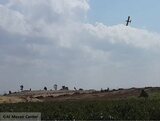
A number of human rights organizations have called on Israel to stop spraying dangerous herbicides over the Gaza Strip, as they endanger health and crops in the besieged coastal enclave, a press release by Adalah – The Legal Center for Arab Minority Rights in Israel said, on Wednesday.
Al Mezan Center for Human Rights in Gaza, Gisha – Legal Center for Freedom of Movement, and Adalah wrote to Israeli Prime Minister Benjamin Netanyahu in his role as Minister of Defense, Military Advocate General Sharon Afek, and Attorney General Avichai Mandelblit with an urgent demand to refrain from conducting further aerial spraying of herbicides inside and near the Gaza Strip, due to the severe damage to crops and the risk to the health of Gaza residents caused by the spraying.
According to media reports and accounts from Gaza residents, on December 4, the Israeli military sprayed herbicides, from the air, over areas inside the Gaza Strip and near the fence separating it from Israel. A variety of crops grown in fields near the fence inside the Strip were damaged, as a result.
WAFA further reports that, in December of 2015, the military confirmed that it uses planes to spray herbicides near the fence in order to clear terrain.
Farmers and local organizations in the Strip report that spraying has occurred since 2014. In June 2016, Gisha, Adalah and Al Mezan submitted a complaint on behalf of eight farmers from Gaza whose crops had been damaged by spraying, calling on the Israeli authorities to refrain from the practice and compensate the farmers, to no avail.
In the letter submitted on Monday, the organizations emphasize that the spraying is a highly destructive measure, infringing on fundamental human rights and violating both Israeli and international law. Contrary to Israel’s official position, whereby the military only sprays herbicides over Israeli territory, farmers in Gaza report that the planes spray over the Strip’s aerial space.
The letter further notes that even if the spraying were to, in fact, take place only on the Israeli side, the chemical agents used are carried by wind over to the Gaza Strip, causing severe damage to crops and disproportionate financial losses to local farmers, meaning that there is no justification or legal basis for the continued use of this destructive practice.
A response submitted by the Ministry of Defense to a Freedom of Information petition, filed by Gisha in 2016, revealed that the chemical agents used in the spraying include glyphosate (“Roundup”), which had been declared a carcinogen by the World Health Organization and has been banned in many countries around the world. Multiple guidelines on the use of this agent entirely prohibit its use by aerial spraying, due to the high health risks associated with it.
The letter also cites a 2007 Israeli High Court decision against aerial spraying, in a case that challenged the Israel Land Administration’s directive to spray fields cultivated in unrecognized villages of the Naqab (Negev) desert, in the south of the country, on the alleged basis that the residents of the lands did not own them. The court ruled the spraying illegal, due to the risks it posed to the health of people, animals, and vegetation in the area.
The letter concludes with a demand to refrain from all spraying in the Gaza Strip area, and to use other, proportionate measures, within Israeli territory, that do not harm farmers in the Gaza Strip or put their crops or their health at risk.
Al Mezan Center for Human Rights in Gaza, Gisha – Legal Center for Freedom of Movement, and Adalah wrote to Israeli Prime Minister Benjamin Netanyahu in his role as Minister of Defense, Military Advocate General Sharon Afek, and Attorney General Avichai Mandelblit with an urgent demand to refrain from conducting further aerial spraying of herbicides inside and near the Gaza Strip, due to the severe damage to crops and the risk to the health of Gaza residents caused by the spraying.
According to media reports and accounts from Gaza residents, on December 4, the Israeli military sprayed herbicides, from the air, over areas inside the Gaza Strip and near the fence separating it from Israel. A variety of crops grown in fields near the fence inside the Strip were damaged, as a result.
WAFA further reports that, in December of 2015, the military confirmed that it uses planes to spray herbicides near the fence in order to clear terrain.
Farmers and local organizations in the Strip report that spraying has occurred since 2014. In June 2016, Gisha, Adalah and Al Mezan submitted a complaint on behalf of eight farmers from Gaza whose crops had been damaged by spraying, calling on the Israeli authorities to refrain from the practice and compensate the farmers, to no avail.
In the letter submitted on Monday, the organizations emphasize that the spraying is a highly destructive measure, infringing on fundamental human rights and violating both Israeli and international law. Contrary to Israel’s official position, whereby the military only sprays herbicides over Israeli territory, farmers in Gaza report that the planes spray over the Strip’s aerial space.
The letter further notes that even if the spraying were to, in fact, take place only on the Israeli side, the chemical agents used are carried by wind over to the Gaza Strip, causing severe damage to crops and disproportionate financial losses to local farmers, meaning that there is no justification or legal basis for the continued use of this destructive practice.
A response submitted by the Ministry of Defense to a Freedom of Information petition, filed by Gisha in 2016, revealed that the chemical agents used in the spraying include glyphosate (“Roundup”), which had been declared a carcinogen by the World Health Organization and has been banned in many countries around the world. Multiple guidelines on the use of this agent entirely prohibit its use by aerial spraying, due to the high health risks associated with it.
The letter also cites a 2007 Israeli High Court decision against aerial spraying, in a case that challenged the Israel Land Administration’s directive to spray fields cultivated in unrecognized villages of the Naqab (Negev) desert, in the south of the country, on the alleged basis that the residents of the lands did not own them. The court ruled the spraying illegal, due to the risks it posed to the health of people, animals, and vegetation in the area.
The letter concludes with a demand to refrain from all spraying in the Gaza Strip area, and to use other, proportionate measures, within Israeli territory, that do not harm farmers in the Gaza Strip or put their crops or their health at risk.
9 jan 2019
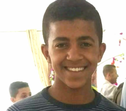
Israeli soldiers invaded, on Wednesday at dawn, Beit Ummar and Surif towns, north and west of the southern West Bank governorate of Hebron, searched many homes and stores, and abducted a child, in addition to illegally confiscating cash.
Several army jeeps invaded Beit Ummar town, north of Hebron, searched homes and abducted a child, identified as Yassin ‘Adel Za’aqeeq, 15.
The soldiers also invaded Surif town, west of Hebron, stormed and ransacked many homes, and illegally confiscated cash from the home of Majed al-Hoor.
In addition, the soldiers invaded and violently searched agricultural stores in Hebron city, causing property damage.
Several army jeeps invaded Beit Ummar town, north of Hebron, searched homes and abducted a child, identified as Yassin ‘Adel Za’aqeeq, 15.
The soldiers also invaded Surif town, west of Hebron, stormed and ransacked many homes, and illegally confiscated cash from the home of Majed al-Hoor.
In addition, the soldiers invaded and violently searched agricultural stores in Hebron city, causing property damage.
8 jan 2019
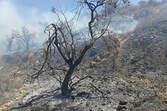
Groups of Israeli settlers on Tuesday destroyed 15 olive trees in Palestinian-owned lands in al-Khalil.
According to local residents, the settlers, who are members of Price Tag gangs, further spray-painted racist slogans on Palestinian property.
In another context, Israel Hayom newspaper on Tuesday reported that the number of Israeli settlers in the West Bank, excluding Jerusalem, reached 448,672 by the end of 2018.
The Hebrew newspaper said that the number of Israeli settlers in 2018 witnessed a growth by 3% compared to 3.4% in 2017 and 3.9% in 2016.
It added that despite the decrease in number given the statistics of the previous years, the numbers documented in the West Bank settlements are higher than those in the territories occupied since 1948.
There are nearly 150 Israeli settlements built on Palestinian lands in the West Bank, apart from the 300 settler outposts established without having the Israeli government's license, and 45% of their residents are under the age of 17.
According to local residents, the settlers, who are members of Price Tag gangs, further spray-painted racist slogans on Palestinian property.
In another context, Israel Hayom newspaper on Tuesday reported that the number of Israeli settlers in the West Bank, excluding Jerusalem, reached 448,672 by the end of 2018.
The Hebrew newspaper said that the number of Israeli settlers in 2018 witnessed a growth by 3% compared to 3.4% in 2017 and 3.9% in 2016.
It added that despite the decrease in number given the statistics of the previous years, the numbers documented in the West Bank settlements are higher than those in the territories occupied since 1948.
There are nearly 150 Israeli settlements built on Palestinian lands in the West Bank, apart from the 300 settler outposts established without having the Israeli government's license, and 45% of their residents are under the age of 17.
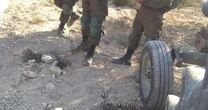
The Israeli occupation forces (IOF) on Tuesday handed Palestinian farmers notices preventing them from working in their lands in Tammun town, east of Tubas city.
The PIC reporter said, quoting local residents, that Palestinian farmers in Umm al-Kbeish area in Tammun were surprised by stop-work orders on the fence of their lands claiming that they are located on an "archaeological area".
Mohammed Bsharat, a Palestinian farmer, told the PIC reporter that Umm al-Kbeish is constantly targeted by the IOF for settlement purposes.
The PIC reporter said, quoting local residents, that Palestinian farmers in Umm al-Kbeish area in Tammun were surprised by stop-work orders on the fence of their lands claiming that they are located on an "archaeological area".
Mohammed Bsharat, a Palestinian farmer, told the PIC reporter that Umm al-Kbeish is constantly targeted by the IOF for settlement purposes.
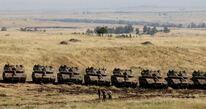
The Israeli occupation forces (IOF) on Tuesday morning launched a military incursion into northern Gaza.
Quds Press said that 8 Israeli military bulldozers rolled a few hundred meters into Beit Lahia town in the northern Gaza Strip.
The news agency added that the IOF opened fire at Palestinian farmers working in their lands east of Khan Younis city, in the southern area of the Gaza Strip.
Meanwhile, Israeli F16 warplanes conducted low altitude flights over large areas of the Gaza Strip.
Quds Press said that 8 Israeli military bulldozers rolled a few hundred meters into Beit Lahia town in the northern Gaza Strip.
The news agency added that the IOF opened fire at Palestinian farmers working in their lands east of Khan Younis city, in the southern area of the Gaza Strip.
Meanwhile, Israeli F16 warplanes conducted low altitude flights over large areas of the Gaza Strip.
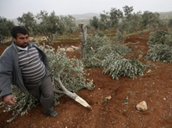
A group of illegal Israeli colonialist settlers uprooted, Tuesday, nearly thirty Palestinian olive trees in the al-Hamra area, east of Yatta town, south of Hebron, in the southern part of the occupied West Bank.
Rateb Jabour, the coordinator of the National and Popular Committees against the Annexation Wall and Colonies in southern West Bank, said the colonists came from the illegal Ma’on and Havat Ma’on colonialist outpost, built on private Palestinian lands.
He added that the trees were planted more than thirty years ago and are owned by members of Rib’ey family.
Jabour further stated that the cutting and uprooting of Palestinian olive trees in the area have escalated over the past few years, as part of the ongoing attempts by the colonists to build and expand their illegal outposts and colonies.
He called on various national, regional and international human rights and legal groups to intervene and help in ending these serious violations targeting the Palestinians, their homes and property, and their sources of livelihood.
Rateb Jabour, the coordinator of the National and Popular Committees against the Annexation Wall and Colonies in southern West Bank, said the colonists came from the illegal Ma’on and Havat Ma’on colonialist outpost, built on private Palestinian lands.
He added that the trees were planted more than thirty years ago and are owned by members of Rib’ey family.
Jabour further stated that the cutting and uprooting of Palestinian olive trees in the area have escalated over the past few years, as part of the ongoing attempts by the colonists to build and expand their illegal outposts and colonies.
He called on various national, regional and international human rights and legal groups to intervene and help in ending these serious violations targeting the Palestinians, their homes and property, and their sources of livelihood.
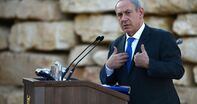
The Israeli occupation government suspended a fund transfer, from Qatar to Palestinian employees, in the besieged Gaza Strip, Israeli TV Channel 20 reported, on Monday.
Israeli authorities claim that freezing the payment came in response to the firing of a rocket, from Gaza, towards Ashkelon.
Former Israeli Defense Minister Avigdor Lieberman said: “It is shameful that [Israeli Prime Minister Benjamin] Netanyahu had recognized that Israel must not fund terror against itself.”
He added, according to Days of Palestine: “I hope that this decision is not related to the elections and that we will not see Netanyahu renew the flow of money to Hamas after April 9.”
The extremist right-wing politician continued: “Anyway, we have to make it clear that the siege will not be facilitate before the release of our soldiers and settlers,” referring to the Israeli soldiers who are being held as prisoners of war in Gaza.
Lieberman resigned from his position as Israel’s Minister of Defense in November, following a disagreement over a recently-signed ceasefire with Gaza.
Born in Moldova, Lieberman was one of the only ministers in the world who did not live in territory officially recognized as his own country. Originally under suspicion over charges of money-laundering and bribery, Lieberman was formally indicted in December of 2012, on lesser charges of fraud and breach of trust.
In 2014, his party was the focus of a corruption probe within the Israeli political spectrum, and, in November of the same year, Lieberman’s life was threatened with an assassination attempt.
Prior to moving to Israel from Moldova, Lieberman worked as a nightclub bouncer. When he moved into an Israeli settlement, he gained infamy when he was charged with beating up a 12-year old boy. He espoused extreme right-wing views, and became a member of the Yisrael Beitenu party, which he now chairs.
Netanyahu blocks Qatar funds to Gaza
The Israeli government on Monday suspended the transfer of Qatari funds to Palestinian employees in the besieged Gaza Strip, according to Israeli media.
Israel's TV channel 20 said that the third batch of the Qatari grant will not be transferred to Gaza based on an order by Prime Minister Benjamin Netanyahu.
Netanyahu's decision coincided with Israel's bombing of three targets in the Gaza Strip on Monday.
Qatar has so far transferred two separate $15 million payments to the Gaza Strip to help employees and poor families who have been living under crippling blockade for about 13 years.
Israeli authorities claim that freezing the payment came in response to the firing of a rocket, from Gaza, towards Ashkelon.
Former Israeli Defense Minister Avigdor Lieberman said: “It is shameful that [Israeli Prime Minister Benjamin] Netanyahu had recognized that Israel must not fund terror against itself.”
He added, according to Days of Palestine: “I hope that this decision is not related to the elections and that we will not see Netanyahu renew the flow of money to Hamas after April 9.”
The extremist right-wing politician continued: “Anyway, we have to make it clear that the siege will not be facilitate before the release of our soldiers and settlers,” referring to the Israeli soldiers who are being held as prisoners of war in Gaza.
Lieberman resigned from his position as Israel’s Minister of Defense in November, following a disagreement over a recently-signed ceasefire with Gaza.
Born in Moldova, Lieberman was one of the only ministers in the world who did not live in territory officially recognized as his own country. Originally under suspicion over charges of money-laundering and bribery, Lieberman was formally indicted in December of 2012, on lesser charges of fraud and breach of trust.
In 2014, his party was the focus of a corruption probe within the Israeli political spectrum, and, in November of the same year, Lieberman’s life was threatened with an assassination attempt.
Prior to moving to Israel from Moldova, Lieberman worked as a nightclub bouncer. When he moved into an Israeli settlement, he gained infamy when he was charged with beating up a 12-year old boy. He espoused extreme right-wing views, and became a member of the Yisrael Beitenu party, which he now chairs.
Netanyahu blocks Qatar funds to Gaza
The Israeli government on Monday suspended the transfer of Qatari funds to Palestinian employees in the besieged Gaza Strip, according to Israeli media.
Israel's TV channel 20 said that the third batch of the Qatari grant will not be transferred to Gaza based on an order by Prime Minister Benjamin Netanyahu.
Netanyahu's decision coincided with Israel's bombing of three targets in the Gaza Strip on Monday.
Qatar has so far transferred two separate $15 million payments to the Gaza Strip to help employees and poor families who have been living under crippling blockade for about 13 years.
7 jan 2019
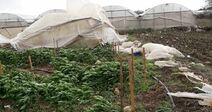
Heavy losses have been inflicted on Palestinian agriculture as a result of the freezing temperatures and stormy winds rocking the Israeli-occupied West Bank.
Speaking with PIC, local sources said hoop houses have fallen apart in Marj Ibn Amer in Jenin and in al-Nazla and Baka, in Tulkarem, among other areas in the occupied West Bank.
Palestinian crops in the Jordan Valley, east of Tubas city, also sustained remarkable damage as a result of the violent winds and swift temperature decrease.
Speaking with PIC, local sources said hoop houses have fallen apart in Marj Ibn Amer in Jenin and in al-Nazla and Baka, in Tulkarem, among other areas in the occupied West Bank.
Palestinian crops in the Jordan Valley, east of Tubas city, also sustained remarkable damage as a result of the violent winds and swift temperature decrease.
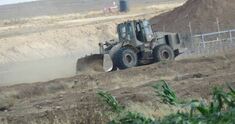
The Israeli occupation army on Monday morning carried out a limited incursion into blockaded Gaza.
Local sources said that four Israeli military bulldozers moved a few hundred meters into Beit Lahia town and leveled Palestinian lands in the northern Gaza Strip.
Another military incursion was reported east of Deir al-Balah city in the middle area of the Gaza Strip.
Meanwhile, the Israeli occupation forces stationed at the border fence opened fire at Palestinian bird hunters east of Khan Younis city, in the southern Gaza Strip. No injuries were reported.
Local sources said that four Israeli military bulldozers moved a few hundred meters into Beit Lahia town and leveled Palestinian lands in the northern Gaza Strip.
Another military incursion was reported east of Deir al-Balah city in the middle area of the Gaza Strip.
Meanwhile, the Israeli occupation forces stationed at the border fence opened fire at Palestinian bird hunters east of Khan Younis city, in the southern Gaza Strip. No injuries were reported.
